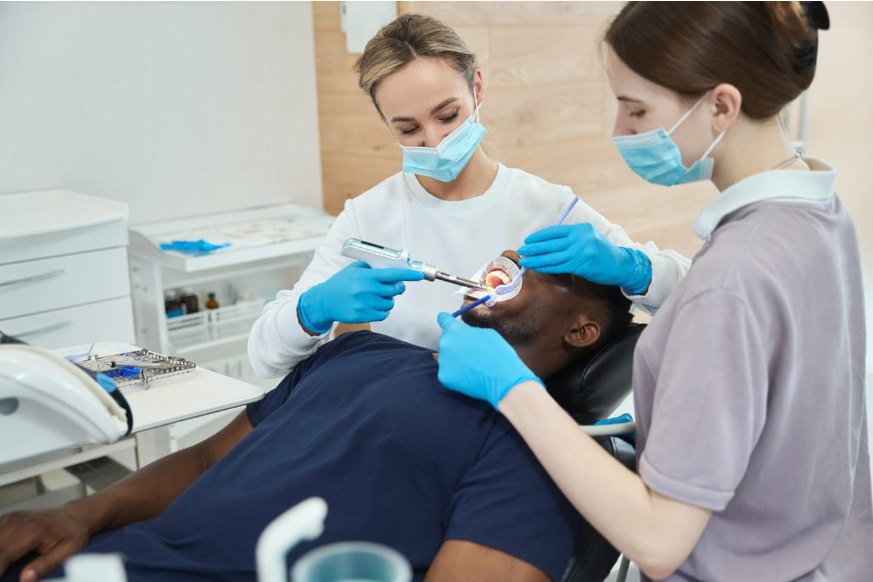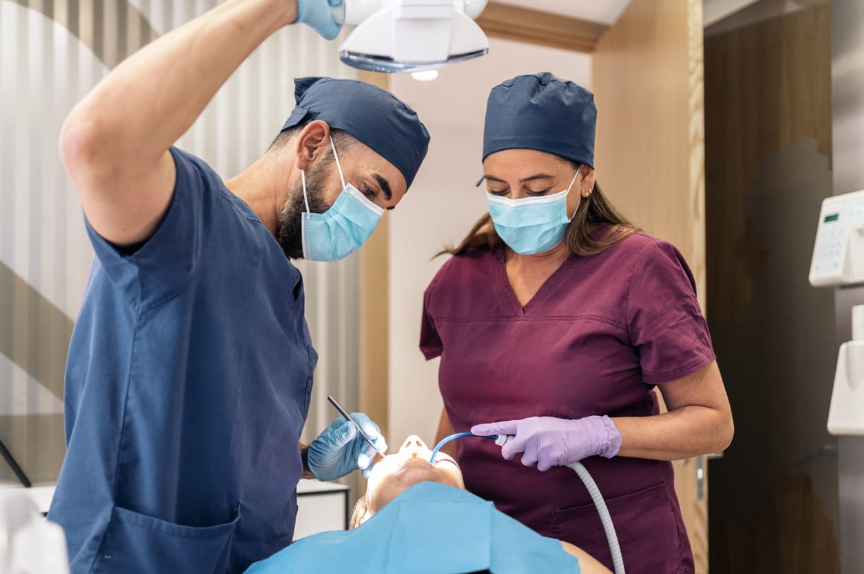Regular dental cleanings are an essential part of maintaining good oral health. While brushing and flossing at home are important daily habits, they are not enough to remove all the plaque and tartar that can build up on your teeth over time. Dental cleanings help prevent cavities, gum disease, and other oral health issues, ensuring your smile stays bright and healthy. But how often should you actually have your teeth professionally cleaned? Let’s explore the factors that determine the ideal frequency for dental cleanings, read patient reviews to see how regular cleanings have helped others maintain healthy smiles.
The Standard Recommendation
For most people, dentists recommend a dental cleaning every six months. This bi-annual schedule is designed to prevent the buildup of plaque and tartar, which can lead to cavities, gum disease, and other complications. Regular cleanings allow your dentist or hygienist to detect any early signs of oral health problems, such as tooth decay or gum disease, making it easier to treat these issues before they become more severe.
Factors That May Affect Your Cleaning Frequency
While the standard recommendation is twice a year, certain factors may require more frequent visits to the dentist. Here are some of the key reasons why you might need cleanings more often than the typical six-month schedule:
- Gum Disease (Periodontal Disease): If you have been diagnosed with gum disease, your dentist may recommend cleanings every three to four months. Gum disease is a chronic condition that can cause gum inflammation, receding gums, and even tooth loss if left untreated. Frequent cleanings can help manage the disease by reducing bacteria and inflammation.
- Smoking: Smoking can lead to a variety of oral health problems, including stained teeth, gum disease, and an increased risk of oral cancer. Smokers often require more frequent cleanings to help manage these issues and maintain better oral hygiene.
- Diabetes: People with diabetes are more susceptible to gum disease because the condition affects the body’s ability to fight infections. If you have diabetes, your dentist may advise you to have cleanings more regularly to help keep your gums healthy.
- History of Cavities: If you are prone to cavities, you may benefit from more frequent dental cleanings. Regular cleanings can help remove plaque and tartar buildup that can lead to tooth decay, ensuring your teeth remain as healthy as possible.
- Orthodontic Treatment: Wearing braces or other orthodontic appliances can make it more difficult to clean your teeth thoroughly. As a result, food particles and plaque can accumulate around brackets and wires, increasing the risk of cavities and gum disease. More frequent cleanings can help prevent these issues while you undergo orthodontic treatment.
- Pregnancy: Hormonal changes during pregnancy can increase the risk of gum disease and other oral health issues. Pregnant women may need to see the dentist more often for cleanings to ensure their teeth and gums remain healthy throughout their pregnancy.
- Dry Mouth: Conditions like dry mouth (xerostomia) can lead to a higher risk of cavities because there is less saliva to wash away food particles and neutralize acids. If you have dry mouth due to medication or other health conditions, your dentist might recommend more regular cleanings to prevent decay.
What Happens During a Dental Cleaning?
During a dental cleaning, a dental hygienist will use specialized tools to remove plaque and tartar from your teeth, particularly in areas that are difficult to reach with regular brushing and flossing. The cleaning process typically involves the following steps:
- Scaling: The hygienist removes plaque and tartar buildup from the surface of your teeth and along the gumline using a scaler.
- Polishing: After the scaling, the teeth are polished to remove stains and smooth the surfaces, making it harder for plaque to adhere to them.
- Fluoride Treatment: Depending on your oral health needs, the hygienist may apply a fluoride treatment to strengthen your teeth and help protect against cavities.
The Importance of Regular Dental Checkups

In addition to cleanings, it’s essential to have regular dental checkups. During a checkup, your dentist will examine your teeth, gums, and mouth for any signs of oral health problems. They may also take X-rays to identify any issues that are not visible to the naked eye. Combining regular checkups with cleanings ensures comprehensive oral care, helping you maintain a healthy and attractive smile.
What Happens If You Skip Dental Cleanings?
Skipping dental cleanings can lead to a range of oral health problems, some of which may become serious over time. Here are some potential consequences of not maintaining regular cleanings:
- Increased Risk of Cavities: Without regular cleanings, plaque and tartar can build up, leading to tooth decay and cavities.
- Gum Disease: Plaque buildup can cause gum inflammation, which can progress to gum disease if not treated. Gum disease can lead to gum recession, bone loss, and even tooth loss.
- Bad Breath: Plaque buildup can also cause persistent bad breath (halitosis), which can be challenging to manage without professional cleanings.
- Staining and Discoloration: Regular cleanings help remove surface stains from food, drinks, and tobacco, keeping your teeth looking bright and white.
Dental cleanings are a vital part of maintaining oral health. For most people, visiting the dentist every six months for a cleaning is sufficient to keep plaque and tartar under control. However, certain individuals may need more frequent cleanings due to specific health conditions, lifestyle factors, or ongoing dental treatments. It’s always best to consult with your dentist to determine the ideal cleaning schedule for your unique needs.
Remember, good oral hygiene practices at home like brushing twice a day, flossing daily, and using mouthwash combined with regular dental cleanings and checkups will help keep your smile healthy and bright for years to come. So, don’t skip those appointments; your teeth will thank you!







